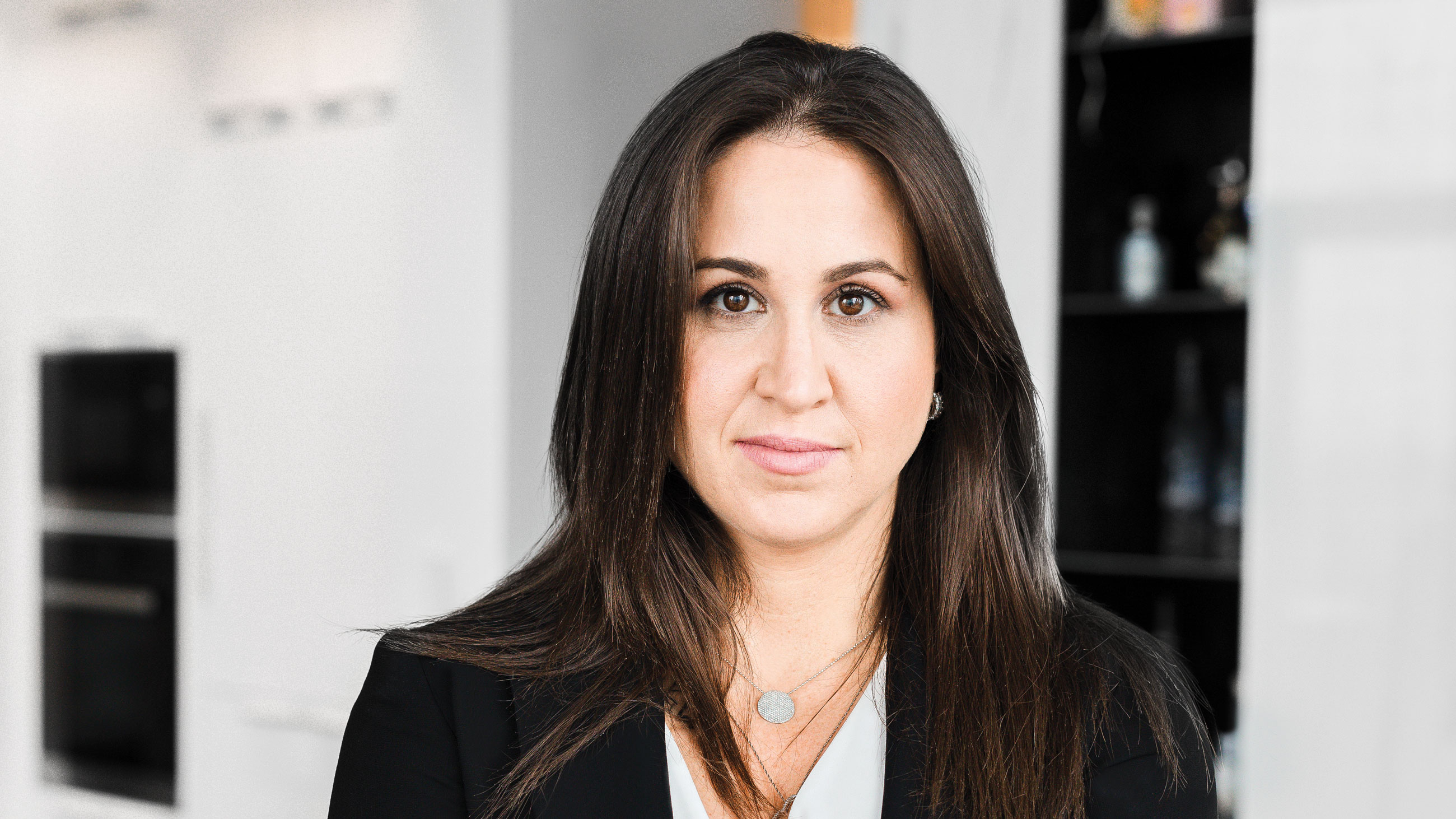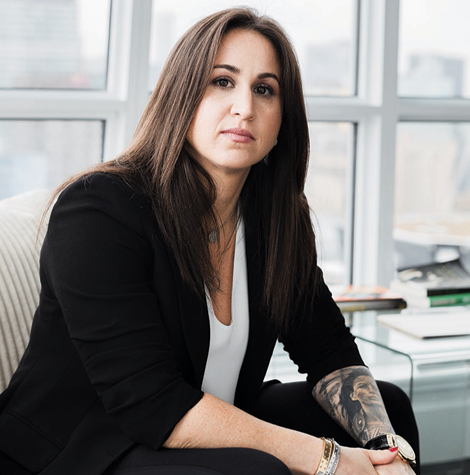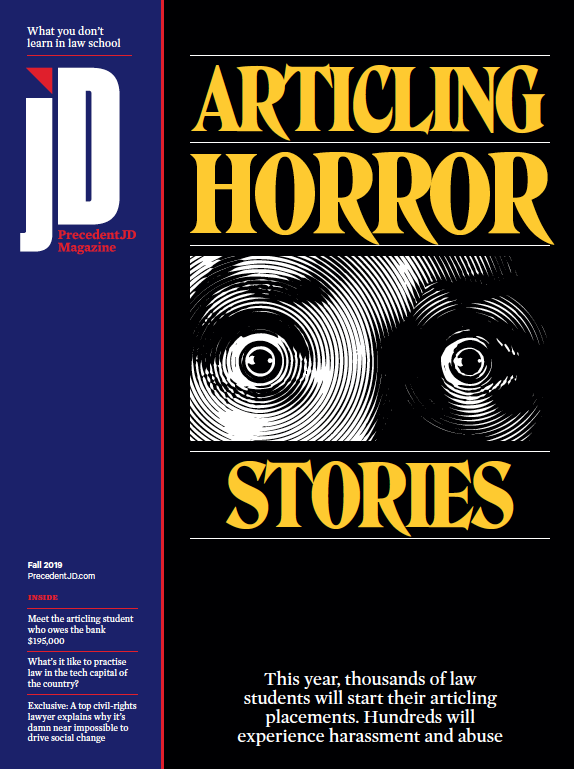
When Jordana Goldlist, a criminal-defence lawyer in Toronto, is in court, she often represents people who are in custody. In those cases, her client typically has to sit at the side of the courtroom, sequestered behind glass inside what’s known as the prisoner’s dock. It looks a bit like a penalty box. At some point, Goldlist will need to have a private word with her client. And when that moment comes, she does something unusual: instead of talking over the glass barrier, she steps inside the dock and takes a seat next to the accused. This drives some people in the courtroom totally crazy.
But Goldlist thinks it’s important to break this professional norm. It helps protect the privacy of her clients, who often face serious charges, including drug trafficking, firearm possession and murder. There’s a reason that Goldlist brings so much compassion to her work: two decades ago, she was the one in trouble with the law. PrecedentJD sat down with the 40-year-old to find out how she turned her life around and why the current system isn’t helping the people who need it.

Jordana Goldlist , founder, JHG Criminal Law
Year of Call: 2008
Can you talk about your personal experience with the criminal-justice system?
The day after I turned 14, my parents sent me to a group home, because I’d been having behavioural issues. After 18 months, I was sent home with the same problems that I had when I left.
By the time I was 16, I was often getting kicked out of my house, so I started selling marijuana to support myself. One day, I got caught selling on school property and was arrested for the second time in three months. I had no one to bail me out, so I ended up at Vanier Correctional Centre. I spent four days in solitary confinement before I was granted bail. Six months later, I plead guilty and was sentenced to two years’ probation.
Four days in solitary seems excessive for a teenage weed dealer.
It made no sense. I had no record, no weapons and no history of violence. That experience really shook me, though. While I was in solitary, I could hear conversations between other girls in the jail, and I noticed that most of them knew each other. They would ask, ‘What are you in for this time?’ To them, it was a lifestyle. I promised myself that this was not going to be me.
And what happened after you were released?
I was expelled from high school. I appealed the decision myself, but dropped out the following year. I spent the rest of my teenage years on the streets.
At 19 years old, I woke up. I went to rehab for six months, and then I went back to school. I graduated from high school at 21 and attended York University on an academic scholarship.
How did you end up at law school?
Law school was something I’d dreamed about as a kid. But I thought that everything I had been through in my teens precluded me from that career. I applied on a leap of faith and was accepted to Osgoode Hall.
I’m surprised that your first job wasn’t in criminal law, but at a civil-litigation boutique.
I always wanted to work in criminal law, but my family wanted me out of the criminal lifestyle completely. I have no regrets, though, about the three years I spent in civil litigation. That’s where I learned how to be a lawyer.
Doesn’t law school teach you to be a lawyer?
Law school teaches you the law, but that’s only 50 percent of the job. It doesn’t teach you how to actually practise, manage clients and work with colleagues.
You’re an example of a person who got “unstuck.” How do we help other people achieve that sort of success?
We need meaningful rehabilitation. We’re just jailing youth, people with mental-health issues and people with addictions. And we’re not providing them with the tools that they need to succeed after their release. We also need employers to hire individuals with criminal records. If people can’t earn a living wage, they are going to reoffend.
How can law schools encourage a more human approach to the law?
We need to recognize that the criminal-justice system judges people on the worst decision they made on the worst day of their life. Law students should be taught to learn someone’s character before they pass judgment based on their file alone.
Timeline of a criminal-defence lawyer
2000: At 21, Goldlist starts her undergrad at York University, where she majors in philosophy. “I love how it forced me to think and rationalize,” she says. “I wanted to focus on reason rather than emotion.”
2004: Goldlist begins law school at Osgoode Hall.
2007 : Upon graduation, she articles at Landy Marr Kats LLP, a litigation boutique in Toronto.
2008: After getting hired back, she works at the firm for two years as an associate. “I learned a lot,” says Goldlist. “But there was so much paperwork. I got tired of sending angry letters for a living.”
2010: Goldlist joins Edward H. Royle & Partners, one of the top criminal-defence firms in Toronto. In her first case, she represents a woman who was charged with importing half a kilogram of cocaine.
2015: The next phase of her career begins, as she launches a solo defence practice: JHG Criminal Law.
2018: Goldlist gets a new tattoo across her back, which depicts three “skater chicks” standing in front of Toronto’s Café Isabella, where she used to hang out as a homeless teen. “I don’t forget where I came from.”

This story is from the 2019 edition of PrecedentJD Magazine
Photography by Kayla Rocca
Hair and makeup by Michelle Calleja
